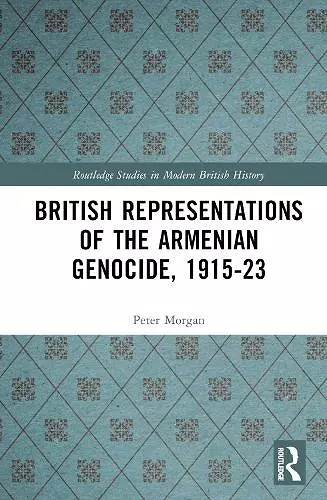British Representations of the Armenian Genocide, 1915-23
Format:Hardback
Publisher:Taylor & Francis Ltd
Published:11th Feb '25
£145.00
Supplier delay - available to order, but may take longer than usual.

This book examines how British politicians, national and local newspapers, writers and commentators discussed the mass killing and deportation of Armenians during the period 1915-1923.
Seeking to fill a historiographical gap in the field of modern genocide studies, this volume shows the extent to which the British public sphere understood the concept of genocide before the Holocaust and before the word itself was invented. It demonstrates the centrality of the British discourse on the Armenian massacres and deportations as they were happening during the First World War and how it came to be as important as that on German excesses in Belgium. This book reveals for the first time how the news was widely circulated in the provincial press and not just in contemporary major titles, and how it found its way into everyday conversation and the subject of an adventure novel. In analysing how the violence was viewed as an orientalist projection onto the Turkish ‘Other,’ this volume makes an important contribution to the literature on the more troubling side of the ‘British Self’ and imperial colonialism.
This volume will be of interest to undergraduates studying First World War Britain as well as researchers investigating the development of modern genocide and how it was discussed and conceptualised.
“In casting a critical light on how British representations of mass killings of Ottoman Armenians shifted from lurid atrocity stories to an awareness of systematic extermination, Peter Morgan demonstrates how a modern articulation of genocide was already set down and widely understood a world war before the term had been invented. The great strength of Morgan’s study is in the rigorously contextual way he throws the spotlight back on the British themselves, thereby suggesting a more complex picture of self-distancing from continental or ‘Oriental’ ‘frightfulness’, yet belied by a closeness to the causes of that violence than their proclaimed humanitarianism would wish to admit. A coruscating study of value to anybody trying to understand the origins of the intimate relationship between modernity and mass murder.”
Mark Levene, University of Southampton, author of ‘The Crisis of Genocide, The European Rimlands, 1912-1953’
“Peter Morgan’s readable and insightful analysis of British responses to and understanding of the Armenian Genocide fills an historiographical gap. While the literature on British responses to the Holocaust is plentiful, there is very little written about perceptions of other genocides. What Morgan reveals is that undoubted concern at exterminatory violence was itself filtered through orientalist understandings of both Turkish and Armenian populations, and indeed racialised perceptions of the British themselves. As such, exterminatory violence, and the way in which it was represented, could both be underpinned by a racialised assumptions. Such important conclusions have implications for how we understand the British relationship with genocidal violence more generally, in that we can see in Morgan’s work the way in which British public and political discourse helped shape a racialised view of the world.”
Tom Lawson, University of Northumbria, author of ‘The Last Man: A British Genocide in Tasmania’
“Peter Morgan has made a major contribution to the historiography of the Armenian Genocide by focusing on the attitudes of the most powerful imperial nation of the time. Great Britain framed its understanding of the atrocities in the Ottoman Empire from its own representation of itself, its war efforts, and the German actions closer to home in Belgium. In the context of total war what appeared anomalous, mass killing of civilians, became a new normal. This work shows that Great Powers contributed as much to the horrors in their inter-imperial wars, even as they self-righteously condemned what the other side was doing. Morgan's account is largely about the British but resonates beyond the members of any one country.”
Ronald Grigor Suny,William H. Sewell, Jr. Distinguished University Professor Emeritus of History and Political Science, The University of Michigan, Emeritus Professor of Political Science and History, The University of Chicago
ISBN: 9781032806679
Dimensions: unknown
Weight: 540g
186 pages